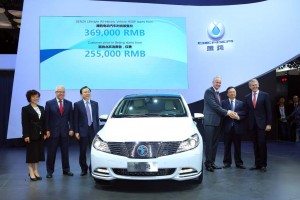
Daimler, which recently announced a joint venture with Chinese maker BYD, is under investigation by anti-monopoly regulators.
It’s the world’s largest automotive market, and manufacturers as diverse as Daimler AG and General Motors already sell more vehicles in China than they do in the U.S. But they and other foreign companies are beginning to wonder “at what price?”
Both GM and Daimler, the parent of Mercedes-Benz — along with Audi, Chrysler and other carmakers — have come under investigation by China’s regulators, who have already levied more than $200 million in fines against a dozen Japanese auto parts suppliers for alleged price fixing.
And while the country’s President Xi Jinping has promised to open up the Chinese economy to increased foreign competition, a new study reveals there’s growing concern that precisely the opposite is happening.
A full 60% of those who responded to a survey by the American Chamber of Commerce in China said they feel “less welcome” in China. By comparison, only 41% responded that way a year ago.
Nearly half of the 365 respondents complained they are being targeted for “selective and subjective enforcement” by Chinese regulators, with a growing sense that the country’s bureaucracy is being used as a shield to help protect local manufacturers who might otherwise fail in the face of foreign competition.
(Russia ready to retaliate, and U.S. automakers could take the hit. Click Here for the story.)
That has been reflected in comments by a number of senior automotive industry executives who have discussed the situation in China in recent months. Few have been willing to express their concerns on the record for fear of angering regulators and triggering still further crackdowns.
Such concerns have been mounting, and not just in the auto industry. Chinese regulators have also been cracking down on food service and other sectors of the economy. Statements in local and government publications have defended such moves, among other things pointing to the problems that have surfaced involving food contamination over the last several years.
Chinese regulators have, meanwhile, asserted that automakers are charging far in excess of justifiable prices for spare parts. And they aren’t alone. India has now levied substantial fines against a wide range of automakers and suppliers, and the largest penalty was assessed against local automotive giant Tata Motors. The U.S., meanwhile, has brought both civil and criminal charges against a number of Japanese partsmakers for alleged price fixing, several senior managers being sentenced to jail.
(India cracks down on automakers, auto parts suppliers. Click Here for the latest.)
But the Associated Press reports that the Beijing government is using such concerns to selectively target foreign companies while largely ignoring domestic firms in a bid to create so-called “national champions” by shielding them from competition – exactly the opposite of what the 6-year-old Chinese anti-monopoly law was intended to achieve.
“Many areas of regulation are overly focused on foreign multinationals,” said the American Chamber’s Chairman Greg Gilligan.
The organization warned that despite the rapid growth of China’s consumer market, such selective enforcement could backfire, China risking the possibility that it “will permanently lose its luster as a desirable investment destination.”
So far, there have been no outward signs of retrenchment, at least in the auto industry, where giants like Volkswagen AG, Toyota, GM and Ford have committed billions of dollars to expand production capacity to keep up with booming demand. But insiders warn they are growing nervous about ongoing trends and wonder whether China will take other steps to boost the fortunes of local auto manufacturers who have continued to lose market share in recent years.
(Volvo “likely” to import S60L from China to the U.S. in 2015. Click Herefor that report.)
Trade officials from the U.S., the European Union and Japan are watching to see if China’s anti-monopoly crackdown crosses into a clear violation of international trade agreements. But government officials insist they are being fair.
“We believe the fairness of the law enforcement will be better reflected as the number of cases increases,” said anti-monopoly director Xu Kunlin, in comments in the English-language China Daily.

Years ago, a friend of mine opened an operation in Japan, a subsidiary of Thetford Corp. based in Ann Arbor. In a very short time business was booming. His products were in great demand, and he was thrilled with the results. Then, slowly, business began to taper off. After a while, demand for his products almost disappeared. What he found after a trip to Japan, was that his designs had been stolen and a Japanese company was making identical products. Given the Chinese disregard for intellectual property and patent rights, I don’t think this is a surprise.
Martin,
We are in agreement about the Chinese. We do business there. However, by design, default, or whatever, the Chinese copy everything and anybody doing business there should know that. It’s a no-brainer to me.
Movies, videos, music… whatever. They even took the tail section of a crashed stealth helicopter that got Osama Bin Laden and copied it.
Like you suggest, they have no respect for intellectual property and in their view, consider it a form of a monopoly.
In the Chinese society, everything is fair game and trying to protect proprietary assets are viewed as bad.